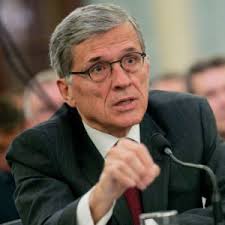
The Federal Communications Commission voted Thursday to regulate Internet service like a public utility, expanding the U.S. government’s oversight of a once lightly regulated business at the center of the country’s commercial and social activity.
The 3-2 vote, along party lines, starts the clock ticking on an expected legal challenge from the telecom and cable industries.
The move marks a turn in the government’s approach to the Internet—from a hands off policy dating back two decades to encourage the Web’s growth to a more interventionist posture as commercial issues have multiplied.
It was spurred on by companies—such as Netflix Inc. —worried that they could face more onerous terms for carrying their traffic and by President Barack Obama , who made an unusual public plea for the rules late last year. The new regulations were strongly opposed by carriers such as Verizon Communications Inc. and AT&T Inc., and they even drew warnings from Google Inc., which told the White House privately it was making a mistake.
The rules prohibit Internet service providers from blocking Web traffic or charging websites for priority service. They also extend the FCC’s reach into the middle of the Internet by saying the commission will review so-called interconnection deals between companies such as Netflix and Comcast Corp. on a case-by-case basis to make sure they are reasonable.
Despite all the wrestling over legal principle, little is likely to change for consumers in the near term. Carriers very rarely block any traffic, and experiments like letting Web companies pay for toll-free mobile service haven’t gone very far. But advocates said the rules will preserve the open environment that has helped Web companies blossom.
FCC Chairman Tom Wheeler, who revealed details of the new rules earlier this month, received a standing ovation when he entered the commission room ahead of the vote.
Apple Inc. co-founder Steve Wozniak, who attended the meeting, said from the sidelines that broadband providers need to be more closely regulated.
“Broadband is essential, like water,” Mr. Wozniak said.
Verizon, in a statement typed on a Remington typewriter and datelined Feb. 26, 1934, harking back to the Communications Act passed that year, criticized the rules as antiquated and likely to create uncertainty that will hurt innovation. The new rules involve reclassifying broadband service as a telecom service regulated by Title II of the Act, which governs the more highly regulated phone business.
Mr. Wheeler reiterated Thursday that the commission is only doing so to establish regulatory authority to enforce net neutrality and it won’t impose more onerous regulations such as price controls.
The full FCC order will be available on the commission’s website within the next few weeks and will take effect 60 days after being published in the Federal Register.
Opponents plan to fight the rules in the Congress and in the courts.
The decision, which has already faced Republican criticism on Capitol Hill, will come under the microscope next month, when the five FCC commissioners are slated to appear before the Senate Commerce Committee.
Lawmakers in both parties have long said an update of telecommunications law is needed, and that clarity from Congress could help the FCC and the courts sort out the legal questions surrounding the issue. After the public outcry in support of strong rules to ensure net neutrality, Republican lawmakers began drafting alternative legislation that would avoid reclassifying broadband as a telecommunications service.
Backers—led by Senate Commerce Committee John Thune (R., S.D.), House Energy and Commerce Committee Chairman Fred Upton (R., Mich.) and Rep. Greg Walden (R., Ore.)—hoped to win bipartisan support to ensure net neutrality, but Democrats had shown less interest in the effort. On Thursday, however, Sen. Bill Nelson (D., Fla.) said he would be willing to continue talks on “true bipartisan legislation.”
A rewrite of telecom law is a huge lift in Congress, especially at a time of such polarization on Capitol Hill. Still, Mr. Thune said Wednesday he thinks the FCC’s action and likely lawsuits could prod lawmakers to act. The last rewrite was in 1996.
The FCC has a poor record with net neutrality in the courts. The U.S. Court of Appeals for the D.C. Circuit in 2010 ruled the commission overstepped when it cited Comcast for slowing down traffic for users of file sharing sites such as BitTorrent. Last year, the same court ruled in favor of Verizon and overturned the FCC’s effort to draft Open Internet rules.
In that ruling, the court said the FCC was trying to regulate Internet providers like traditional “common carrier” telecommunications services, such as landline phone systems, even though the commission had explicitly decided not to classify broadband as a telecommunications service. The reclassification of Internet service under Title II is an effort to patch that hole.
Unlike the previously rejected rules, the rules fully apply to wireless service and give the FCC new powers to oversee deals in the middle of the Internet, where companies such as Netflix and intermediaries such as Cogent Communications Holdings Inc. link up with the networks owned by Verizon, Comcast and others.
Network owners are pushing harder to get paid when hooking up websites such as Netflix that bring waves of traffic. Netflix complained publicly last year that broadband companies were slowing delivery of its video service to gain leverage in pricing discussions. The dispute helped nudge the net neutrality debate into the mainstream.
The FCC’s new rules let the agency police those agreements based on whether it finds them just and reasonable. It isn’t clear how the agreements would be evaluated, and critics claim the commission is on shakier legal ground overseeing those relationships. [Wall Street Journal]

